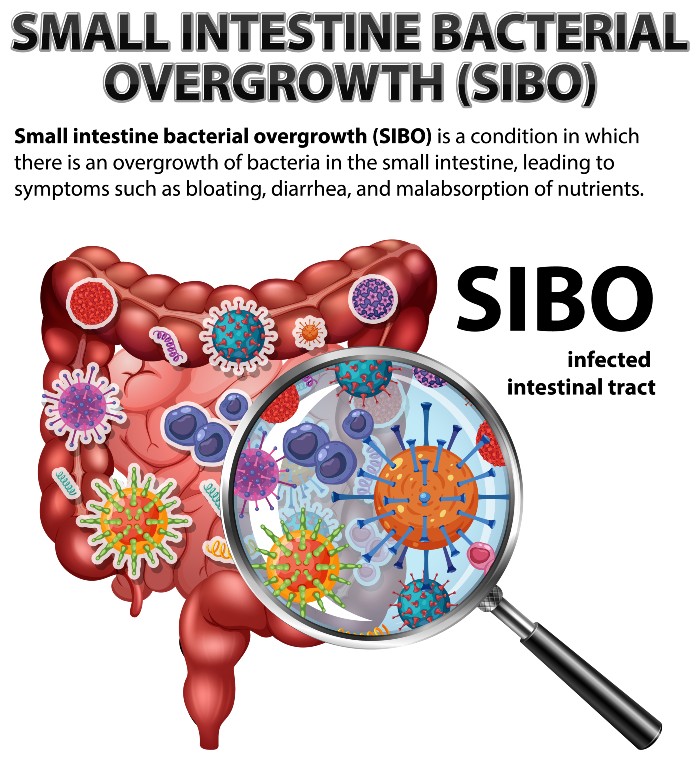No products in the cart.

Small intestine bacterial overgrowth
Small Intestine Bacterial Overgrowth (SIBO) is a condition where excessive bacteria are present in the small intestine. While the gut microbiome plays a crucial role in our health, an imbalance, especially in the small intestine can lead to significant digestive issues and other systemic problems. This blog aims to provide a comprehensive overview of SIBO, including its causes, symptoms, diagnosis and dietary management.
What is SIBO?
Small Intestinal Bacterial Overgrowth (SIBO) is a medical condition where an unusually high number of bacteria accumulate in the small intestine. The small intestine normally contains relatively few bacteria compared to the large intestine. In SIBO, an excessive amount of bacteria migrate to the small intestine, leading to a range of digestive issues and other health complications.
Causes of SIBO
Some of the common causes of SIBO are:
- Impaired motility: Conditions that affect the movement of intestine like irritable bowel syndrome and gastroparesis, can slow down the passage of food & bacteria, creating an
environment conducive to bacterial overgrowth. - Structural abnormalities: Abnormalities such as diverticula, adhesions from surgery or strictures can trap bacteria in the small intestine.
- Reduced gastric acid production: Conditions like chronic atrophic gastritis or the use of proton pump inhibitors reduce stomach acid, which normally helps control bacterial
growth. - Immune system disorders: Conditions like HIV/AIDS or immunoglobulin deficiencies can impair the body’s ability to control bacterial growth.
- Surgery: Surgical procedures like gastric bypass or ileocecal valve resection can disrupt the normal anatomy and motility of the small intestine, leading to SIBO.
- Certain medications: Long term use of medications that affect gut motility or stomach acid can contribute to SIBO.
Symptoms of SIBO
The symptoms of SIBO can vary, but common symptoms include:
- Digestive issues: This can include bloating, abdominal pain or discomfort, cramping or general discomfort in the abdominal area, diarrhea, constipation, excessive flatulence or belching.
- Fatigue: Some people with SIBO report feeling unusually tired or weak.
- Malabsorption: Poor absorption of nutrients, leading to deficiencies.
- Weight loss: Unintentional weight loss due to poor nutrient absorption.
- Steatorrhea: Fatty stools that are foul smelling and difficult to flush.
- Nutrient deficiencies: Deficiencies in vitamins and minerals, particularly vitamin B12, iron, and fat soluble vitamins (A, D, E, K).
- Joint pain: SIBO can cause aching or discomfort in joints.
Dietary management of SIBO
Dietary management is a crucial aspect of managing SIBO. Here are some key dietary strategies:
- Low FODMAP diet: This diet reduces fermentable oligosaccharides, disaccharides, monosaccharides and polyols, which are short chain carbohydrates that can be poorly absorbed in the small intestine and fermented by bacteria, causing symptoms.
- Low fermentation diet: Low fermentation diet limits foods that are easily fermented by gut bacteria, which can help reduce bloating and gas. So it’s better to reduce foods high in fiber and resistant starch.
- Probiotics: Introducing beneficial bacteria through probiotics may help restore balance in the gut microbiome.
- Fermented foods: Foods like curd, kefir and sauerkraut can introduce beneficial bacteria. However, their effects can vary among individuals with SIBO.
- Regular Meals: Eating smaller, more frequent meals can help regulate gut motility and prevent bacterial overgrowth.
- Avoiding sugar and refined carbohydrates: Foods high in sugar, refined carbohydrates and alcohol should be limited as they can feed harmful bacteria. So limiting intake can help manage SIBO symptoms.
- Hydration: Drinking adequate water supports digestion and overall gut health.
- Identifying and avoiding food triggers: Keeping a food diary and eliminating foods that worsen symptoms can help manage SIBO more effectively.
SIBO is a complex condition that requires careful management. Understanding the underlying causes, recognizing symptoms early and seeking appropriate treatment can help those affected by SIBO improve their quality of life.

Dietitian



